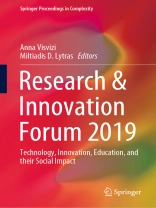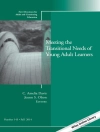This book features research presented and discussed during the Research & Innovation Forum (Rii Forum) 2019. As such, this volume offers a unique insight into emerging topics, issues and developments pertinent to the fields of technology, innovation and education and their social impact.
Papers included in this volume apply inter- and multi-disciplinary approaches to query such issues as technology-enhanced teaching and learning, smart cities, , information systems, cognitive computing and social networking. What brings these threads of the discussion together is the question of how advances in computer science – which are otherwise largely incomprehensible to researchers from other fields – can be effectively translated and capitalized on so as to make them beneficial for society as a whole.
In this context, Rii Forum and Rii Forum proceedings offer an essential venue where diverse stakeholders, including academics, the think tank sector and decision-makers, can engage in a meaningful dialogue with a view to improving the applicability of advances in computer science. In brief, Rii Forum takes the imperative inherent in the 4th industrial revolution seriously, in that it identifies ways of making technology usable and therefore inclusive.
Tabella dei contenuti
Simulating Peer Assessment in Massive Online Open Courses.- Development Strategies and Trends in Educational Solutions for Deaf Students.- Unpacking the Privacy Paradox for Education.- 21st Century Skills. An analysis of theoretical frameworks to guide educational innovation processes in Chilean context.- Cloud Platform for Enabling a Student Collaborative Assessment Process.- Serious Games in Mechanical Engineering Education.- Learning Process Using Telegram and Discussion Forums in Online Higher Education.- Integrating Makerspaces in Higher Education: Constructionism Approach to Learning.- Definition of a feature vector to characterise learners in adaptive learning systems.- Gender and learning outcomes in entrepreneurship education.- Clickbait in Education – Positive or Negative? Machine Learning Answers.- Improve student participation in peer assessment to influence learning outcomes: a case study.- Learning with Wikipedia in higher education: academic performance and students’ quality perception.- A hybrid machine learning approach for the prediction of grades in computer engineering students.- Computational thinking in basic education in a developing country perspective.- Cognitive computing approaches for human activity recognition from tweets – A case study of Twitter marketing campaign.- Assessing Strategies for Sampling Dynamic Social Networks.- Facebook Engagement – Motivational Drivers and the Moderating Effect of Flow Episodes and Age Differences.- Temporal Trend Analysis on Virtual Reality Using Social Media Mining.- Using User Contextual Profile for Recommendation in Collaborations.- A step further in Sentiment Analysis application in Marketing Decision-Making.- Knowledge Integration in Personalised Dietary Suggestion System Using Semantic Web Technologies.- Using Physical Activity Monitors in Smart Environments and Social Networks: Applications and Challenges.- Predicting stock price returns using political and financial sentiment.- Emotion recognition to improve e-healthcare systems in smart cities.- Smart City and Technology Transfer: Towards Sustainable Infrastructure .- Smart cities to create opportunities for young people.- Overview of Threats and Vulnerabilities in Smart Cities.- Mexico City traffic analysis based on social computing and machine learning.- Management city model based on blockchain and smart contracts technology.- Emerging Computer Vision based Machine Learning Issues for Smart Cities.- The CRISP-DCW Method for Distributed Computing Workflows.- Towards a software engineering framework for the design, construction and deployment of machine learning-based solutions in digitalization processes.- Applied Data Science in Financial Industry: Natural Language Processing Techniques for Bank Policies .- Handing a Hybrid Multicriteria Model for Choosing Specialists to Analyze Application Management Service Tickets.- Data strategy framework in servitization: Case study of service development for a vehicle fleet .- Big Data Dimensionality Reduction For Wireless Sensor Networks Using Stacked Autoencoders.- BYOD, Personal Area Networks (PANs) and IOT: Threats to Patients Privacy.- Towards to early diagnosis of dementia in people with HIV / AIDS using Bayesian networks.- A Hybrid Model to Guide the Consultation of Children with Autism Spectrum Disorder.- Use Of EEG Technology With Based Brain-Computer Interface To Address Amyotrophic Lateral Sclerosis- ALS.- Big Data-Assisted Word Sense Disambiguation for Sign Language.- Identifying relationships between Important Barriers for Disabled Entrepreneurs’ in India.- Surfing the Waves of Digital Automation in Spanish Labor market.- Impact of Linguistic Feature Related to Fraud on Pledge Results of the Crowdfunding Campaigns.- Sustainable economic development: some reflections on access to technology as a matter of social engagement.- Using Crowdsourcing to Identify a Proxy of Socio-Economic status.- Io T-Iaa S: A New Public Cloud Service to Unleash Innovation in the Io T Space.- The climb to success: a big data analysis to find out why Huawei has conquered the market.- Identification of factors of indigenous ethnic identity: a case study on the Waorani Amazonian ethnicit.- Analysis of Virtual Currencies as Driver of Business Marketing.- Conceptual Modeling as a Tool for Corporate Governance Support: State of the Art and Research Agenda.- Price Determinants of Tourist Accommodation Rental: Airbnb in Barcelona and Madrid.- Towards Personality Classification through Arabic Handwriting Analysis.












